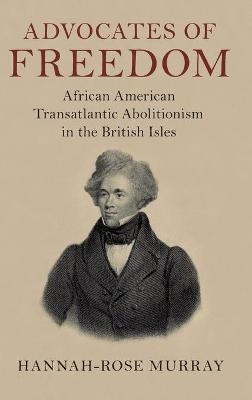
Advocates of Freedom
Cambridge University Press (Verlag)
978-1-108-48751-1 (ISBN)
During the nineteenth century and especially after the Civil War, scores of black abolitionists like Frederick Douglass, Moses Roper and Ellen Craft travelled to England, Ireland, Scotland, and parts of rural Wales to educate the public on slavery. By sharing their oratorical, visual, and literary testimony to transatlantic audiences, African American activists galvanised the antislavery movement, which had severe consequences for former slaveholders, pro-slavery defenders, white racists, and ignorant publics. Their journeys highlighted not only their death-defying escapes from bondage but also their desire to speak out against slavery and white supremacy on foreign soil. Hannah-Rose Murray explores the radical transatlantic journeys formerly enslaved individuals made to the British Isles, and what light they shed on our understanding of the abolitionist movement. She uncovers the reasons why activists visited certain locations, how they adapted to the local political and social climate, and what impact their activism had on British society.
Hannah-Rose Murray is Early Career Leverhulme Research Fellow in English Literature at the University of Edinburgh, researching formerly enslaved oratorical, visual and literary testimony in the British Isles during the nineteenth century.
Introduction: 'To Tell The Truth': African American activism in the British Isles 1835–1895; 1. 'It Is Time For The Slaves to Speak': Moses Roper, white networks and 'Lying Inventions' 1835–1855; 2. 'All the Bloody Paraphernalia of Slavery': Frederick Douglass' performative strategies on the Victorian stage; 3. '[They Have] Not Ceased to Hold My Hand Since': Frederick Douglass, print culture and abolitionist networks; 4. To 'Frighten The Hyena Out Of His Ferocity': black activism in Britain 1850–1860; 5. 'I Would Much Rather Starve In England, A Free Woman, Than Be A Slave': black women and adaptive resistance 1850–1865; 6. 'Have No Fellowship I Pray You, With These Merciless Menstealers': black activism, the Confederacy and scientific racism during the Civil War 1861–1865; 7. 'My Name is Not Tom': Josiah Henson, Uncle Tom's Cabin, and adaptive resistance after the Civil War 1876–1877; 8. 'The Black People's Side Of The Story': Ida B. Wells and the anti-lynching crusade in Britain 1893–1894; 9. 'To Tell the Story of the Slave': the legacy of African American transatlantic resistance.
| Erscheinungsdatum | 06.10.2020 |
|---|---|
| Reihe/Serie | Slaveries since Emancipation |
| Zusatzinfo | Worked examples or Exercises |
| Verlagsort | Cambridge |
| Sprache | englisch |
| Maße | 160 x 235 mm |
| Gewicht | 720 g |
| Themenwelt | Geschichte ► Allgemeine Geschichte ► Neuzeit (bis 1918) |
| Geisteswissenschaften ► Geschichte ► Regional- / Ländergeschichte | |
| ISBN-10 | 1-108-48751-3 / 1108487513 |
| ISBN-13 | 978-1-108-48751-1 / 9781108487511 |
| Zustand | Neuware |
| Haben Sie eine Frage zum Produkt? |
aus dem Bereich


